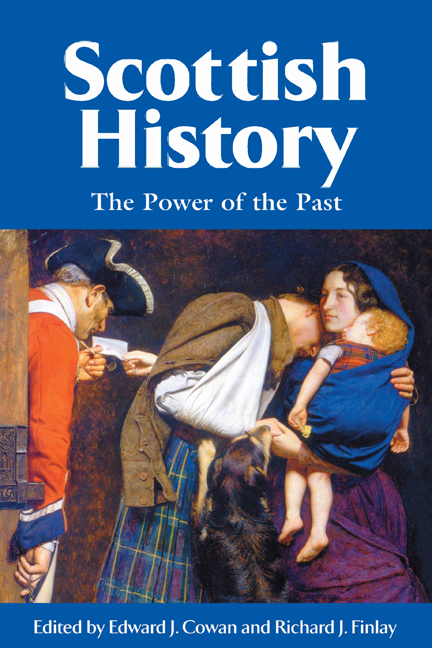Book contents
- Frontmatter
- Contents
- Contributors
- Introduction
- 1 The Picts‘ Place in the Kingship's Past Before John of Fordun
- 2 The Demonisation of King John
- 3 Late Medieval Scotland and the Matter of Britain
- 4 In Search of the Scottish Reformation
- 5 Civil Society and the Celts: Hector Boece, George Buchanan and the Ancient Scottish Past
- 6 The Covenanting Tradition in Scottish History
- 7 ‘What's in a Name?’: Pedigree and Propaganda in Seventeenth-Century Scotland
- 8 The Ideological Uses of the Picts, 1707-c.1990
- 9 The Jacobite Cult
- 10 Queen Victoria and the Cult of Scottish Monarchy
- 11 ‘Their Laurels Wither'd, and their Name Forgot’: Women and the Scottish Radical Tradition
- 12 Tomorrow's Ancestors: Nationalism, Identity and History
- Index
5 - Civil Society and the Celts: Hector Boece, George Buchanan and the Ancient Scottish Past
Published online by Cambridge University Press: 24 September 2020
- Frontmatter
- Contents
- Contributors
- Introduction
- 1 The Picts‘ Place in the Kingship's Past Before John of Fordun
- 2 The Demonisation of King John
- 3 Late Medieval Scotland and the Matter of Britain
- 4 In Search of the Scottish Reformation
- 5 Civil Society and the Celts: Hector Boece, George Buchanan and the Ancient Scottish Past
- 6 The Covenanting Tradition in Scottish History
- 7 ‘What's in a Name?’: Pedigree and Propaganda in Seventeenth-Century Scotland
- 8 The Ideological Uses of the Picts, 1707-c.1990
- 9 The Jacobite Cult
- 10 Queen Victoria and the Cult of Scottish Monarchy
- 11 ‘Their Laurels Wither'd, and their Name Forgot’: Women and the Scottish Radical Tradition
- 12 Tomorrow's Ancestors: Nationalism, Identity and History
- Index
Summary
The purpose of this chapter is to explore certain aspects of Lowland attitudes to the Highlands, and more particularly the language, culture and history of the Gaels, as these developed in the sixteenth century. In a sense, this is a very straightforward, though hardly edifying, story. From the suppression of the Lordship of the Isles in 1493 through to the Statutes of Iona in 1609, one can trace increasing hostility and contempt among Scots-speaking Lowlanders for the manners and mores of their Gaelic-speaking compatriots - a hostility and contempt that by the close of the sixteenth century was commonly articulated in polarised terms as the difference between Lowland ‘civility’ and Highland ‘barbarism’. Of course, this process of polarisation began long before 1493 and continued long after 1609, but it is not the intention here to try and explain in any detail why it occurred or even to comment more than indirectly on the roots and implications of the language in which it came to be couched. As a preliminary, however, it is important to establish a broad interpretative framework within which these developments can be set.
Two interrelated perspectives offer themselves as obvious candidates for explaining what, from a Lowland point of view, came to be identified as the ‘Highland Problem’. On the one hand, in the course of the long sixteenth century demographic and tenurial change saw a more dynamic and urbanised Lowland economy outstripping its Highland equivalent and underwriting the smug self-righteousness with which the inhabitants of the former came to regard those of the latter. It was, for example, commercial motives that helped to shape James Vi's perceptions of the Highlands and Islands as not just an untamed wilderness, but a kind of Gaelic Eldorado whose immense riches were there for the taking. On the other hand, however, while the significance of the Highlands and Islands as a potentially lucrative source of crown revenues should not be underestimated, James’ attitude to Gaeldom was also clearly inspired by the related need to bring the outlying reaches of the realm more firmly under direct royal control.
- Type
- Chapter
- Information
- Scottish HistoryThe Power of the Past, pp. 95 - 120Publisher: Edinburgh University PressPrint publication year: 2020



